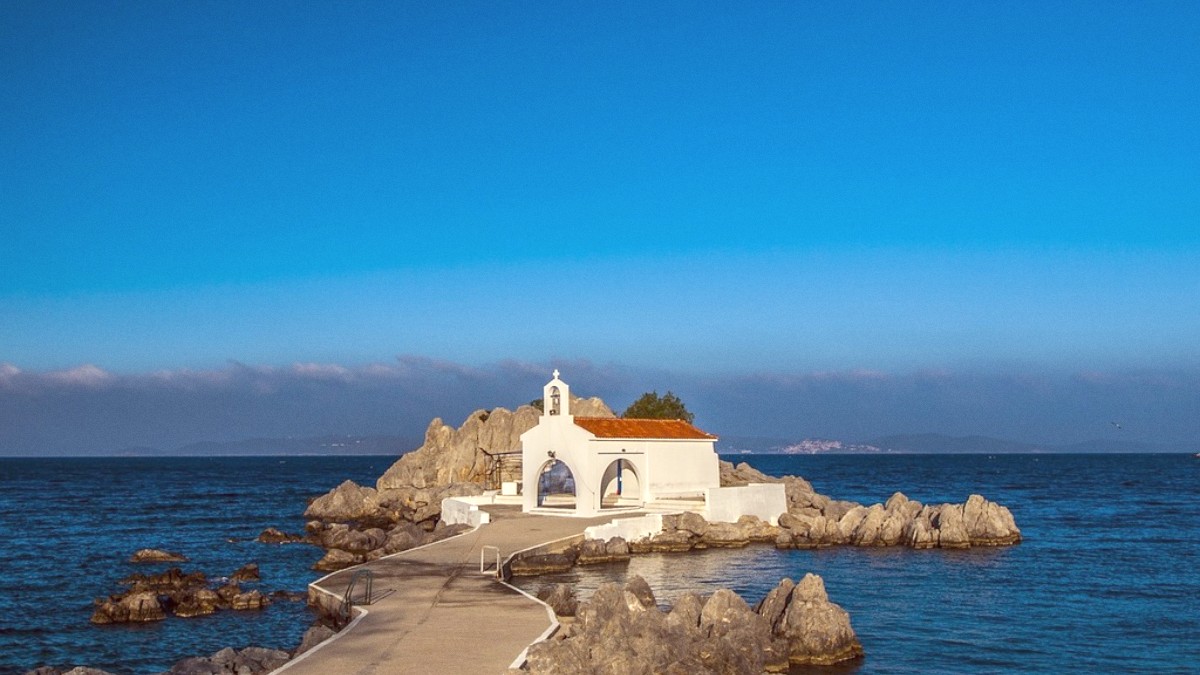
Northeastern Aegean Islands, Greece
Chios holds the unique status as the world's only producer of mastic, a natural resin with ancient beginnings. This resin forms much of the island's southern landscape and economy, forging a distinct cultural identity. Its historical expanse, marked by distinguished events and habitation for thousands of years, gives layers of interest to any journey. Guests searching for an island balancing natural beauty with real local life discover a pleasant welcome.
Chios belongs to the Northeastern Aegean Islands group, positioned close to the Turkish mainland. It ranks as the fifth largest Greek island, covering approximately 842 square kilometers (325 square miles). Its size supports varied geographical features, from the fertile plains and mastic-producing villages in the south to the more rugged, mountainous terrain and isolated beaches in the north.
The island's coastline stretches for about 213 kilometers (132 miles), featuring a mix of sandy beaches, pebble shores, and dramatic cliffs. Its location near Asia Minor historically influenced its culture, trade, and strategic significance. Despite its size, Chios keeps a spacious feeling, with ample room for exploration without feeling overcrowded. The central part of the island holds rolling hills and olive groves, while the northern reaches become wilder, inviting hikers and those seeking quiet. Chios Town, the capital, sits on the eastern coast, facing the strait separating Greece from Turkey. The island's geography directly influences its climate, a classic Mediterranean pattern with hot, dry summers and mild, wet winters. This climate, coupled with specific soil conditions, creates the unique environment for the mastic tree to thrive, making Chios the sole global producer of this resin.
Chios displays a long and layered history, visible in its archaeological sites, medieval villages, and Byzantine monasteries. Human habitation on the island dates to the Neolithic period. Its strategic location in the Aegean made it a prized possession through antiquity, leading to periods of prosperity and conflict. During ancient times, Chios became a prominent maritime and commercial power, recognized for its wine, which traveled across the ancient world. The island also is a strong claim as the birthplace of Homer, the legendary epic poet, a tradition celebrated at sites like "Homer's Stone" in Vrontados. Significant archaeological finds from these periods reveal insight into its early growth. The Byzantine era saw the building of impressive religious monuments, most notably the Nea Moni Monastery, an 11th-century masterpiece and an UNESCO World Heritage site.
This period brought constant threats from pirates and invaders, which led to the creation of the unique Mastichochoria, fortified medieval villages in the south, built to safeguard the precious mastic groves and their inhabitants. These villages, with their closed, defensive architecture, show a remarkable adaptation to historical insecurity. Later, under Genoese rule from the 14th to the 16th century, Chios knew a period of economic flourishing, notably due to Genoese management of the mastic trade. Many of the island's fortifications, including parts of Chios Castle, bear Genoese engineering marks. The Ottoman period came next, bringing further cultural influences, still visible in architecture and customs. A tragic chapter in Chios's history unfolded during the Greek War of Independence in 1822, when the infamous Chios Massacre occurred, devastating the island's population and leading to widespread international outcry. Despite this immense loss, Chios slowly recovered, restarting its prominence in shipping and commerce. Today, these historical layers define Chios. From ancient ruins to medieval strongholds and Ottoman fountains, the island serves as a living museum, offering countless chances to connect with its past. The resilience and continuity of its traditions, specifically around mastic cultivation, link modern Chians directly to their ancestors.
Chios works for travelers seeking an authentic Greek island journey away from mass tourism. It caters to those who appreciate history, unique culture, and natural exploration.
A journey into unique mastic culture and medieval charm. Expect diverse beaches, genuine Greek hospitality, and a relaxed pace.
Culture and History Enthusiasts, Nature Lovers and Hikers, Authenticity Seekers, Foodies, Families, Couples.
Good for Independent Exploration. Renting a car makes for the best way to uncover the island's hidden corners.
Taste fresh seafood, local cheeses, and dishes flavored with mastic. Savor local wines.
Discover these unmissable locations and experiences on Chios:
Visit Nea Moni Monastery, an 11th-century UNESCO World Heritage site with stunning Byzantine mosaics. Explore Mesta and Pyrgi, the most famous mastic villages, architectural marvels of medieval defense. Tour the Mastic Museum, a modern, interactive museum dedicated to Chios's unique resin. Wander through Chios Town, the bustling capital, home to the castle, museums, and a lively port.
Experience Mavra Volia Beach, a spectacular beach known for its black volcanic pebbles and deep blue waters. Indulge in local cuisine, savoring fresh seafood, local cheeses, and a variety of dishes flavored with mastic. Enjoy a relaxed pace of life, typical of authentic Greek island living. Look for opportunities to observe traditional mastic harvesting from late August to early October.
Image: Chios Town waterfront and port, facing the sea.
Chios is a captivating destination for those seeking a more traditional and less tourist-heavy Greek island experience.
The island caters to varied interests, from deep dives into medieval heritage to active explorations of its rugged and serene landscapes.
Explore medieval mastic villages, Byzantine monasteries, and archaeological sites for a rich historical journey.
Diverse landscapes, from rugged northern mountains to unique volcanic beaches, make for outdoor activities.
Find a genuine Greek experience, where local traditions thrive and tourism blends with daily life.
Chios also offers a pleasant setting for other types of travelers: